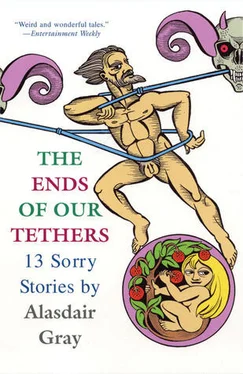“The theme of all your poems is the great poet you are going to be. It is a prologue to your life’s work, a convincing prologue, but not enough.”
“Why not?”
“Take the first poem, the best, and the first verse, also the best: Bone caged, blood clagged, nerve netted et cetera. You are describing a state of confinement and frustration everyone has sometimes felt, poets and housewives and schoolchildren and ditch diggers and college lecturers. Right?”
“Hm. Maybe,” said Aiblins.
“Verse two. Loft-haunter, tunnel-groper, interloper et cetera. Here you state your feelings of being both above and below other people, being an outsider as we called ourselves in the sixties, so you’re still talking for a lot of people, especially young ambitious ones. Right?”
“You’re getting warm.”
“Then comes I am the Titan and my pen et cetera. You now declare yourself a masterful figure like Prometheus, someone who will help humanity recover something fine that it has spoiled and lost: innocence perhaps, faith, hope, love — only God knows what. So you are not now speaking for most folk, you are describing what only very confident priests, politicians, prosperous idealists, teachers, artists and writers sometimes feel, while speaking mainly for Luke Aiblins.”
Aiblins smiled and nodded.
“Now look at verse three! Crown, King, Divinity, all shall be mine . What do these three words with initial capitals mean?”
“You tell me. You are the grand panjandrum, the salaried professor, the professional critic. I’m just a humble poet. You tell me my meaning.”
“I think they mean that you feel sublimely smug because of your verbal talent.”
“Do you think all my poems convey that?”
“I’m afraid so.”
“Even the love poems?”
“Did you write any? Name one.”
“OUTING.”
Opening the folder I said “Let’s hear it!” and read aloud the following.
This sunken track through the rank weeds
of docken, nettle & convolvulus
does not belong to us: only to me
whose nostrils gladly drank the stink
of vegetable sweat ,
whose ears sucked in
the sullen whimper of the gnat’s wing,
who gladly felt the wet sting of
smirr upon the cheek .
So do not talk, say no word to me
but walk in stillness on a path of moss,
a slope of trees upon our right hand side
and on our right the cluck & flow
of a wide stream .
I do not know what you see here.
I do not want to know .
For if each tries to see those things
the other sees
our probing eyes will shatter
the brittle matter of the other’s dream
so each of us will be
inside a toneless, tasteless, aimless world
of mediocrity .
Walk in my dream and I will walk in yours
but do not try to share our separate dreams.
Two dreams can touch, I think,
but there’s an end
of dreaming if we try to make them blend
for this can only be when both of us lie bare
and I have felt the ripeness of your flesh .
When bodies mix
then even dreams can melt .
“A love poem?” I asked, smiling.
“Why not?”
“It doesn’t give the faintest idea of the companion it addresses, not even her or his sex.”
“Shakespeare’s sonnets aren’t exactly portraits either.”
“True, but it’s clear the people he addresses are fascinating, and that he loves them. You tell your companion to shut up so that you can enjoy some very dull scenery, though at the end you seem to anticipate …”
I hesitated.
“Getting into her knickers?” suggested Aiblins.
“That’s one way of putting it.”
“Low marks for the start and the later poems. What about the last?”
“I’m glad you reminded me!” I said, greatly relieved, “At first it’s bathos didn’t impress me but now I think it is your best piece of verse — truly objective — not self-vaunting at all. You emerge here at last from the shell of your ego. Yes yes yes, here it is —” A SPELL AGAINST ENVY
Rascals whose energy made history
had splendid banquets, buildings,
songs of praise
they never made. Digestion, rot and fires
undid their solid things. The finest hymns
cannot outlive the language of their choirs .
Only the joy of making things anew
outlive the owners & the makers too —
those fabricators, songsters, cooks who give
web, honeycomb, nest, burrow, beaver dam,
house, clothing, story, music & tasty stew .
“Though lacking the gaiety Yeats thinks essential this is a highly successful Marxist version of his poem Lapis Lazuli ,” I cried, laughing.
“Never read it.”
“Never mind. Perhaps you strain the last two lines by squashing into them every kind of animal and human maker you can think of, but it’s still a good piece of serio-comic light verse. But the other poems resemble the efforts of a runner jogging up and down at the starting line before the pistol is fired.” “Another simile,” said Aiblins brightly. “What are you reading these days?”
“Henryson’s Fables .”
“You enjoy that stuff?” said Aiblins, incredulously.
“Yes. When I concentrate I find it astonishingly good. I’m concentrating just now because I’m reviewing a new edition of them for Cencrastus .”
“Hallelujah! Keep concentrating. I’m sticking to Shakespeare. Have you read The Two Gentlemen of Verona ?”
“No. I’ve never even seen it acted.”
“You should. It’s great. Some idiots think he wrote very little of it but —”
For fifteen or twenty minutes Aiblins talked about The Two Gentlemen of Verona until I had no desire to read or see that play, then he looked at what seemed a new expensive wristwatch, apologised for having to leave now, lifted the folder, went to the door and paused to say, “Mark Twain.”
“Yes?”
“Have you read his American Claimant ?”
“No.”
“You should. And don’t blame yourself too much for the things you’ve just said. A couple of them made sense. Think on! I’ll contact you when I need you. Cheerio.”
I was left feeling horribly confused. Was he a genius? Was I an idiot? His damned Proem kept repeating in my head when I would have preferred to remember McDiarmid’s The Watergaw or Hardy’s After a Journey or even Lear’s Dong With the Luminous Nose . Did that mean it was better than these? Impossible. But why could I not forget it? He had said he would contact me. A few weeks after seeing him I approached his sociology lecturer. She was chatting with colleagues in the staff club.
“Pardon me,” I said, “Can you tell me how Luke Aiblins —”
“I can tell you nothing about Luke Aiblins except that he is mad, stupid, nasty and has, thank God, left this place for good.” She turned her back to me.
The college changed its creative writing teacher every two years, perhaps to avoid paying a pension contribution due to regular teachers. I found similar jobs elsewhere, then had a book of poems published, then another. With an American friend I visited Edinburgh Castle and saw that an attendant in one of the regimental museums was Ian Gentle. I asked if the job bored him. He shrugged and said, “Not more than teaching, or punching railway tickets, or nursing in a mental hospital, or canning peas, which I have also tried. It’s like reincarnation. You don’t need to die to become somebody else. Have you read Schopenhauer’s The World As Will and Idea ?”
Читать дальше












